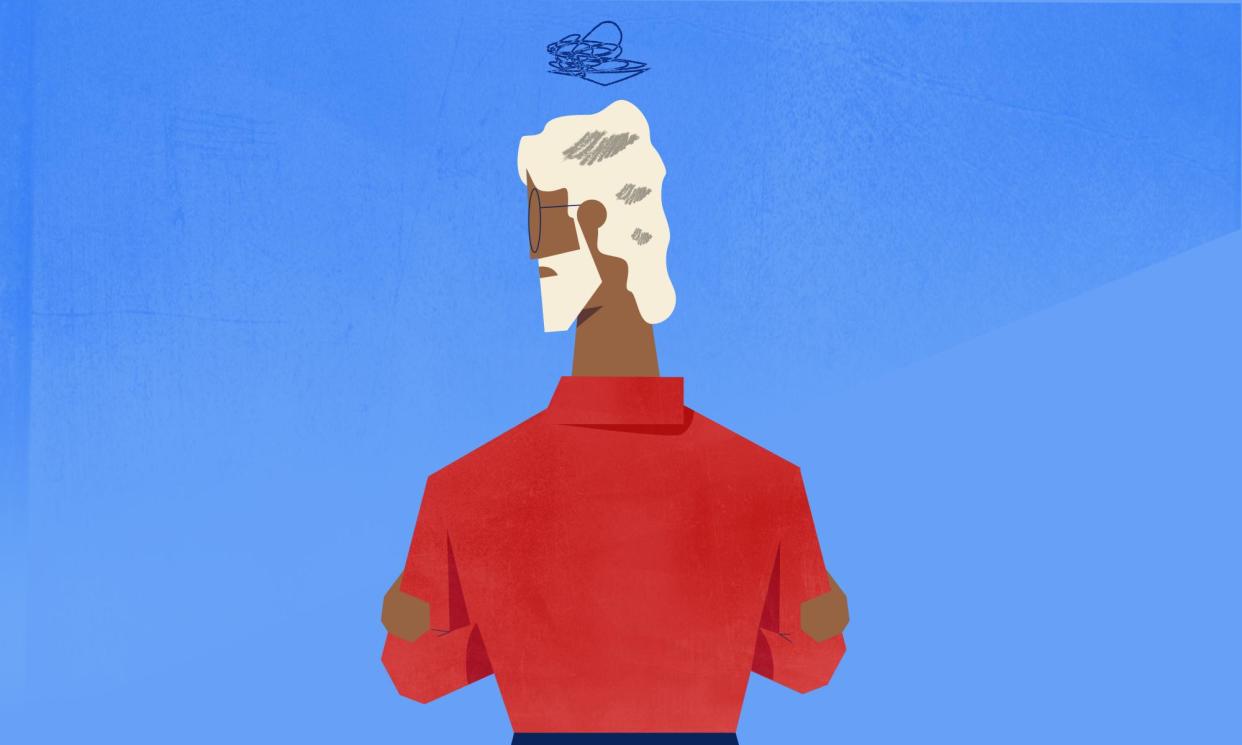Living with my depressed husband is ripping me apart. What can I do?

I am in my mid-30s and have been with my husband, who is 10 years older than me, since I was a teenager.
I felt very loved, at least for much of our time together. A couple of years ago, however, things changed.
We became parents while I was in university. I found a job and friends, and while I sometimes struggled with it all, I became a fairly happy person. Meanwhile, he struggled with his career and became extremely restless.
He says he loves me and our family, but I just don’t feel it any more, because he has very intense and increasing depressive moods. He often says that he is at the wrong place or living a wrong life. He is jealous of his friends but doesn’t acknowledge that they have different jobs, more money, older children or are, most ironically, divorced. He puts a lot of pressure on me to change our life in a way which would mean that I don’t get enough rest and calls me “defiant” and “hostile” when I try to defend the way I want to spend my free time.
He puts pressure on me to change our life in a way that would mean I don’t get enough rest, and calls me ‘defiant’ when I object
We have serious communication issues, partly because I have become a straightforward person and he has some really serious problems with conflicts (not just with me, but in general). We go to therapy together to improve communication, but the next day he will be gloomy and silently resentful towards me again. I told him that not being happy with him any more is ripping me apart, because I like him as a person and I don’t want to destroy our family. He said that he cannot talk to me about his feelings, since he is afraid of my reaction. I am a very good listener, and it was established in our very first therapy session that my reactions are strong but not abnormal, considering the immense pressure he has put me under for a long time.
I have spent many hours trying to help him with his problems, explaining myself, and they are forgotten in an instant when he is low and we are back where we started. Although he also feels that things are bleak, he was shocked to hear that I have recurrent thoughts of leaving. He does not want to end things, ever.
I owe him a lot and I really want to make him happy, but I also want to be me.
I was a little troubled by your letter. I have a lot of sympathy for your husband’s depression and I wonder if he has sought help from his GP, but I am concerned by a few things.
You got together when you were very young, he much older. Did things work because you were so beholden to him, and now that you are finding your feet and not quite so reliant, he doesn’t like it? Also, the pressure you expressed in your letter felt tangible.
I went to psychoanalytic psychotherapist Susanna Abse, who felt your relationship had probably been “very close and intense for quite a long time before children arrived”. She wondered how the transition to you becoming parents had been, as this is often challenging.
We really discover who we are in our 20s, and sometimes a relationship started much earlier can either deepen or flounder if it doesn’t flex to allow for this growth.
‘Defiant’ is the sort of word a parent might use about an adolescent, not a man about his partner
I thought the word “defiant” was really interesting in your letter – that’s the sort of word a parent might use about an adolescent, not a man about his partner.
If you went to university at the usual age then your children must be in their early teens? How and where do they feature in all this, and what is it like at home for them? There was no further mention of them.
In your longer letter you said there was violence in your background, growing up. Abse said: “If angry or upset feelings were repressed or expressed in a way that was scary or dangerous [by your parents, when you were growing up]”, explains Abse, “it can be difficult for a couple to have healthy conflict, and this can lead to depression in one partner because there’s repressed anger which cannot be expressed in a positive way”.
I would hope these are things you’ve explored in your therapy. If not, maybe it’s time to try a different type?
You deserve to be happy and to be loved for being you. You cannot do all the emotional work for both of you.
Please have a chat with someone at Refuge, because I can’t be sure your relationship isn’t controlling and I want to keep you and your child(ren) safe.
• Every week, Annalisa Barbieri addresses a personal problem sent in by a reader. If you would like advice from Annalisa, please send your problem to ask.annalisa@theguardian.com. Annalisa regrets she cannot enter into personal correspondence. Submissions are subject to our terms and conditions.
• Comments on this piece are premoderated to ensure the discussion remains on the topics raised by the article. Please be aware that there may be a short delay in comments appearing on the site.
• The latest series of Annalisa’s podcast is available here.


